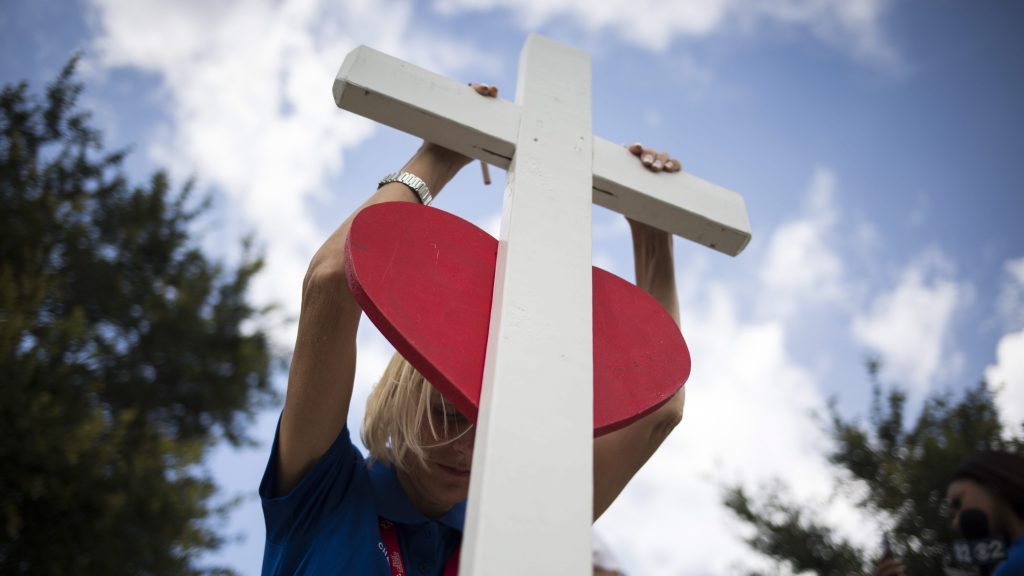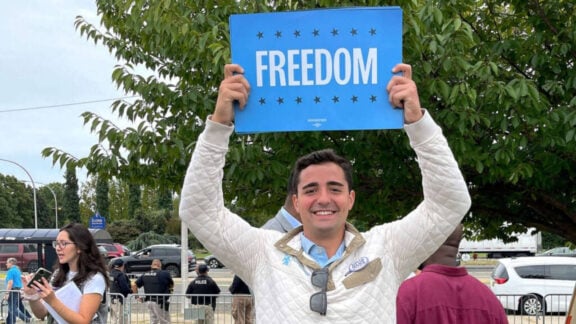What exactly happened in Orlando, Florida, last Sunday? The answer depends on which source you choose to get your news from – because some outlets chose to downplay one of the key elements of the horrific mass shooting: that it happened in a gay club. Perhaps it should not come as a surprise, but this tragedy proved to be a stress test on the power of denial. Which passed the test with relative ease, proving to be one of the major forces that dominate public discourse. It is telling of the sad state the public sphere is in, that we filter events through half-truths, in order to confirm our world view, and in this case the half-truth was that the lunatic who invaded the club and murdered 50 people, was a Muslim fanatic, who wanted to attack the values of our society.
This is true. But it is not the whole truth. It actually adds insult to injury, when we downplay the fact that the mass shooting had a specific target: members of the LGBTI community. This was not an attack on “western values”. This was an example of homophobia at its worst, the kind of intolerance that is the trait of fanatics. If we want to see it as an attack on western values, we should at least acknowledge which values we’re talking about: tolerance, acceptance, inclusiveness, diversity, civil rights and individual freedom. In fact, if we want to defend our values from the blind hatred and terror that extremists seek to impose, then we should further enhance them. Make tolerance, acceptance and inclusiveness the foremost priority in our communities.
In an ironic turn of events, this nightmare found the Greek LGBTI community recovering from the hangover of a joyous party. That same weekend, the streets of Athens –and mainly the Syntagma square– was flooded with people celebrating Athens Pride. As is the case with most such events around the developed world, it was a party, full of glitter, music and dancing, with a little bit of politics on the side. It was also an event that had many in Greece wondering aloud “why is such an event even needed, as the gay community is not oppressed in Greece”. The Orlando shooting might have woken these people, as every ‘western-value-inclined’ person, to a stark reality: that no one is ever safe from hatred and intolerance, especially if it is armed. But, especially for Greece, Pride took a new meaning, as it happened months after what was a turning point for human rights in the country: the official recognition of civil union between two citizens of the same sex. It was a major step forward for equal rights in Greece, coming after a long debate, and it is a firm reminder that no society can claim to be advanced, as long as there are citizens who have less rights than others.
About the same time that the Greek Parliament voted the recognition of civil partnership, the parliament of Victoria passed a law that allows same-sex couples to adopt children. This did not call for a parade, as it is seen as a logical next step towards diversity and inclusiveness, in a modern, open society. In fact, the Andrews government has proved to be a very strong defendant of the LGBTI community in its quest for equal rights. It was only a few weeks ago that Daniel Andrews delivered a speech in Parliament, that might prove to be one of the most significant ones in modern Australian history; the first government apology to those convicted for being homosexual. “There was a time in our history when we turned thousands of ordinary young men into criminals.
“And it was profoundly and unimaginably wrong,” he said, noting that “it’s never too late to say sorry – and mean it”, describing this obsolete law being due to “a prejudice that ruined lives”.
“It is the first responsibility of a Government to keep people safe”, he went on; “but the government didn’t keep LGBTI people safe”. And he ended with a powerful message: “If you are a member of the LGBTI community, and there’s someone in your life that you love – a partner or a friend – then do me a favour: Next time you’re on a tram in Melbourne, hold their hand. Do it with pride and defiance. Because you have that freedom. And here in the progressive capital, I can think of nothing more Victorian than that”.
It is this kind of thinking that led the State of Victoria to defy the federal government and continue with the Safe Schools program, that aims to tackle homophobia and transphobia in schools, and to create safer educational environments for same sex attracted, intersex, and gender diverse students, teachers and families. The anti-bullying program has been the target of a series of conservative groups, who eventually managed to strong-arm the federal government into gutting it, at least in terms of content.
The issue was the object of a heated debate for the past few months and it is strange that it is absent of all the discourse going on during this election campaign. In fact, for a brief while, it seemed that even the issue of marriage equality – the law to allow same-sex couples to tie the knot – would be one of the issues that would determine the elections. But political leaders don’t seem willing to go into this discussion, both major parties having opted to postpone the vote for after the elections (at least, the Coalition has stopped talking of a referendum, for the time being). It doesn’t matter that most polls suggest that the majority of Australians support marriage equality; the major parties are afraid of the wrath of Christian and conservative groups.
There is one such group that decided to take action during this period, and it hits too close to home. The Greek Orthodox Archdiocese of Australia has planned two events, targeting same-sex marriage and the Safe Schools program, to take place in Melbourne next weekend (after similar events that took place in Sydney this weekend). One would expect more from a church that is based on the message of unconditional love (and especially from a branch that has proven its allegiance to this message, by organising an overwhelming fundraiser for the benefit of the refugees who have arrived in Greece for the past year), than target an anti-bullying program. If it wants to stay true to its core values, the church should be a champion of any program that sees to teach the concept of inclusiveness, acceptance and, in fact, unconditional love, among students. The church should know that acceptance does not come easily; sometimes it needs to be taught. The Greek community should know that, having gone a long way from being the underdog to becoming an example of the strengths and benefits of a diverse, inclusive society. Defending ‘family values’, as if they are threatened by people who actually want to start families, is an absurdity of its own, but targeting children who might feel unwelcome and are the constant target of bullying verges on to being ‘anti-Christian’. Even if there is one student in the total of the country’s schools, who is bullied for being different, for wanting to express his gender in an individual way, then this is a failure of the school system in total. A developed society should be mature enough to accept that, and work towards creating an inclusive environment for all, no matter what. By opposing this, the Greek Orthodox Archdiocese does not only position itself on the wrong side of history; it positions itself on the wrong side of humanity. The fanatics who target our ‘western values’ should be very happy about this.









